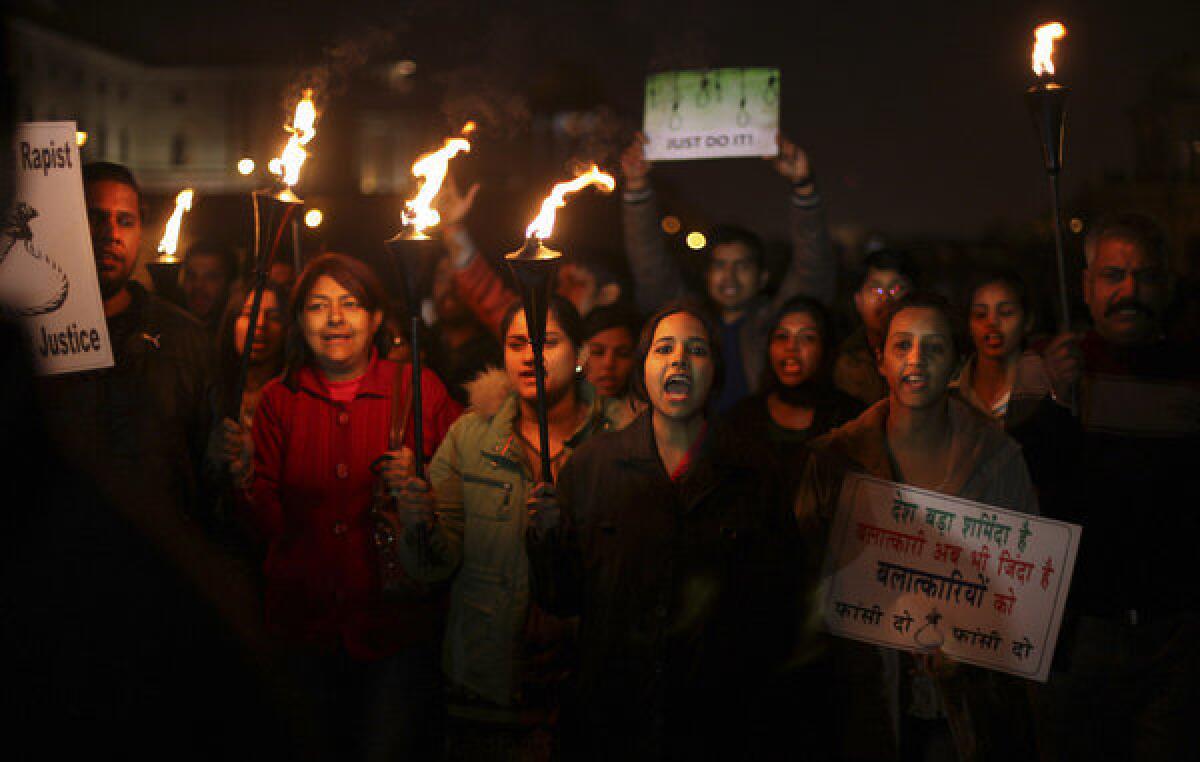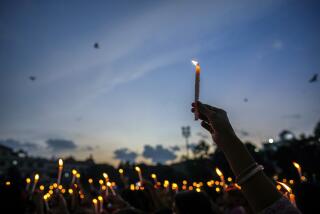Indian protesters clash with police over rape case

- Share via
NEW DELHI — Thousands of people demonstrated outside the Indian president’s residence in New Delhi on Saturday, breaching barricades and clashing with police over the brutal rape of a 23-year-old girl before authorities drove them back with sticks, tear gas and water cannons.
Public anger has been building all week since the attack last Sunday in which six men in a private bus allegedly picked up the victim, a medical student, and her 28-year-old male friend as they headed home about 9 p.m. after watching “Life of Pi” at a multiplex theater.
The pair thought they were boarding a normal commuter bus when the men, who were on a joy ride, allegedly beat them with metal rods and raped her for 30 minutes as the vehicle drove around the city and passed several police posts before dumping the pair by the side of the road. The bus had curtains and tinted windows, which are illegal but not uncommon in New Delhi.
Six men have been arrested in the case, including the bus driver, his brother, a gym instructor and a fruit seller, and face charges of kidnapping, gang rape, unnatural offenses and robbery. Three of the six have reportedly confessed.
Indian media reported that one of those held, the brother of the driver, was assaulted by other inmates at Tihar Jail before officials separated him from others at the facility.
Protesters on Saturday, the sixth and most violent day of demonstrations, chanted “We want justice” and carried signs reading “Kill the rapists!” “Hang them now” and “Stop the shame.” More than 30 demonstrators and 35 police officials were injured, according to media reports, as protesters threw stones and broke the windows of a public bus.
Police said four subway stations near the government district would be closed Sunday in a bid to control crowds and keep people from the area.
While New Delhi has seen the most intense protest, other cities have also expressed anger and outrage over the last week. In Meerut, Kanpur and Lucknow in the central state of Uttar Pradesh, demonstrators carried placards demanding an end to pornographic websites and called for tougher steps against rapists. In Bangalore, more than 600 women formed a human chain, shouting slogans against state and federal governments for their “inaction and failure to protect women.” And in Mumbai, people gathered at the beach to conduct a candlelight vigil in support of the victim.
While high-profile rape cases and violence against women are common in India -- and especially in New Delhi, which is known as the nation’s “rape capital” -- the brutality of this case has struck a national nerve.
In response to this latest attack, the government announced it had suspended eight police officers for dereliction of duty, was setting up a judicial commission of inquiry and considering an amendment in the criminal code making rape in certain extreme cases subject to the death penalty.
Opposition lawmakers have called for a special session of parliament to focus on sexual harassment, an idea the government has rejected, perhaps fearful it will be pilloried. A parade of celebrities have expressed their outrage including cricket player Yuvraj Singh, who sent out the Twitter message: “If this is the way women are treated, God save our society.”
The 23-year-old victim, whose identity has not been disclosed, is reported to be in critical but stable condition after a week on a ventilator. On Saturday, she was well enough to give a statement to police. Doctors at Delhi’s Safdarjung Hospital had to remove most of her intestines to arrest gangrene that had set in.
“She is very brave and positive and optimistic about her future,” said Dr. Abhilasha Yadav, a senior psychiatrist at the hospital. “Her biological functions are normal and psychologically she is totally balanced and composed.”
According to official figures, rape cases doubled in India between 1990 and 2008, with 21,397 rape incidents recorded nationwide in 2009. Women’s groups, however, say the real figures are far higher given social stigma and police corruption and indifference. A poll by the Thomson Reuters foundation listed India as the world’s fourth most dangerous place for women, worse than Somalia and only slightly better than Afghanistan and Congo.
A great deal of public anger over last Sunday’s attack has been directed at police, including the Delhi High Court that criticized them for being “evasive” over who was responsible. “Is the police deaf, blind?” read one headline on the Times Now TV news network. “Inept police flex muscle,” read another.
Home Minister Sushil Kumar Shinde met with a small number of demonstrators Saturday afternoon. At a news conference a few hours later, he said he reassured them that the government shares the public’s outrage over the attack and will file a case shortly. He also appealed for calm.
“This is not a way to protest,” echoed R.P.N. Singh, the minister of state for home affairs, in comments to local media. “Trying to storm buildings and breaking barricades is not a way to start a dialog.”
Delhi Chief Minister Sheila Dikshit said the capital has approved five fast-track courts to try the rape cases. In an interview she added that she “hates Delhi being called ‘rape capital,’ but it has indeed become one.” In 2011, New Delhi recorded 453 rape cases compared with 239 for Mumbai, the second highest among the nation’s cities, according to India’s National Crime Records Bureau.
U.N. Woman, an agency of the world body, has called on the Indian and New Delhi governments “to do everything in their power to take up radical reforms, ensure justice and reach out with robust public services to make women’s lives more safe and secure.”
ALSO:
Pope pardons former butler convicted of theft
Bombing kills local official, 7 other people in Pakistan
Tensions high as vote on proposed Egyptian constitution continues
More to Read
Sign up for Essential California
The most important California stories and recommendations in your inbox every morning.
You may occasionally receive promotional content from the Los Angeles Times.













